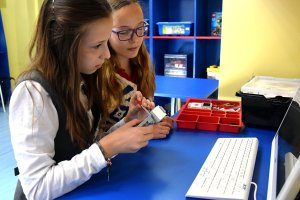Lego is no longer just child’s play, its specialised kits are a tried and tested way for young people to learn about scientific and technical principles and have fun while they do it – as students at the Lauder-ORT No 134 “Dimcho Debelianov” Jewish School are now finding out.
The school in the Bulgarian capital, Sofia, has become the first in the country to open a Design and Technology laboratory, although it’s quickly become known simply as “the Lego lab”.
Both students and staff are excited by the possibilities the lab opens up, as is ORT Bulgaria President Dr Emil Kalo, who sits on the school board.
“It’s very important that we make education special for children and this lab makes the learning process much more pleasant,” Dr Kalo said. “But it’s only the first step on our journey to raise the level of science and technology teaching at the school. The next step is to acquire a 3-D printer to add to our computer design facilities.”
The new “Lego lab” provides an excellent opportunity for cross-curricular STEM education and for teaching programming skills.
The lab is targeted mainly at students in grades 5 to 9, who will learn an advanced science curriculum and robotics while older students will study Arduino, which is on another level of robotics and electronics. Children will also be introduced to entrepreneurship by developing new robots, for example, and learning how to market and sell them.
It also serves as a bridge across which it is hoped more elementary students will choose to cross over into the higher grades at what is Bulgaria’s only Jewish school.
Currently, about one-third of students leave after the 7th grade. In doing so they limit their Jewish education and often grow up to be less involved in the Jewish community.
But the lab gives younger students a glimpse of the exciting learning opportunities that will be open to them if they stay on, enabling the high school to open a new ICT and science study track.

Students from the ORT school in Sofia enjoying the new lego lab
“The lab will be a world to itself where the children can create whatever they want, without boundaries,“ said ORT Bulgaria National Director Plamen Petrov. “This is because many of the lessons will be extra-curricular so they won’t have to worry about mistakes affecting their grades – they can let their imagination run free.”
Mr Petrov said the Lego lab would provide a focal point for inviting representatives from high tech companies to give presentations to the students as well as the basis for attracting extra support from the state, which has special programmes to encourage technology education.
“Being part of the ORT international network has been a great help,” Mr Petrov added. “Our colleagues in Ukraine and Russia have long developed expertise in this field. [ORT Odessa Director] Anna Michurina, in particular, has given us a lot of advice.”





